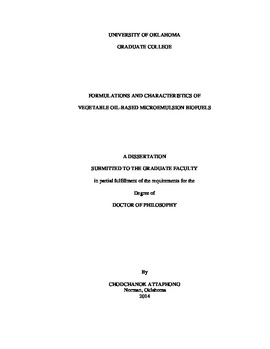| dc.description.abstract | Biofuels have been increasingly explored as alternative renewable fuel sources due to the growing global energy demand, petroleum-based fuel depletion, and the negative effects of global exhaust emissions from fossil fuels. There has been a large amount of research on biofuel technologies and development in recent years. Among all types of liquid biofuels, vegetable oils and bio-alcohols have become of special interest since they can be utilized in engines with and/or without modification. Nonetheless, the limitations of their use are the long-term operation problems from high viscosity of vegetable oils and low energy content of bio-alcohols. Transesterification is the most common method to reduce the viscosity of vegetable oils through the chemical reactions with methanol and/or ethanol. Although biodiesel, the product from this process which is also considered as a biofuel, has comparable fuel properties to No.2 diesel, it has cold weather limitations, generates high nitrogen oxide levels in the exhaust gases of some engines, and produces unpurified glycerol as co-product causing disposal problems. Therefore, vegetable oil-based microemulsification has been proposed as a method to reduce the vegetable oil viscosity using low viscous alcohols while eliminating the chemical reaction and avoiding the unpurified glycerol. In addition, vegetable oil-based microemulsion can overcome the immiscibility between alcohol and oil phases. Microemulsions are thermodynamically stable mixtures of water and oil stabilized by surfactant and/or cosurfactants. Owing to their ultralow interfacial tension and high solubilization capacity, microemulsions are enviable for various applications such as food, cosmetic and pharmaceutical, enhanced oil recovery, and biofuel applications. Microemulsion fuels are transparent, single-phase, and thermodynamically stable mixtures where the polar phase is solubilized in reverse micelles occurring in the non-polar phase stabilized by surfactants. In this dissertation, vegetable oil-based microemulsion fuels have been developed and the effects of ambient temperature, surfactants, cosurfactants, alcohols, vegetable oils, and additives on phase behavior have been evaluated. Next, pollutant emission characteristics of products generated by their combustion (soot, CO, and NOx) and fuel properties (i.e., viscosities, and cold flow properties) of selected microemulsion fuel systems on have been evaluated. This work showed that various formulations of vegetable oil-based microemulsion fuels have comparable fuel properties to canola biodiesel, achieve the ASTM standards of No.2 diesel, and produce more favorable pollutant emissions than canola biodiesel and No.2 diesel. Moreover, the ability to achieve temperature robustness was demonstrated for particular cases depending on user considerations (e.g., sustainable, environment-benign, and/or cost-effective considerations). Most importantly, this dissertation provides useful results for further design and development of microemulsion fuels as potential alternatives with the ultimate goal of environmental sustainability. | en_US |
